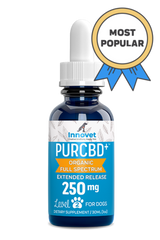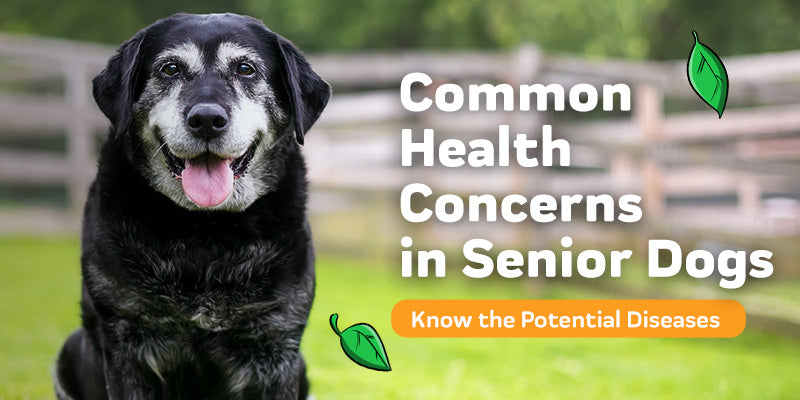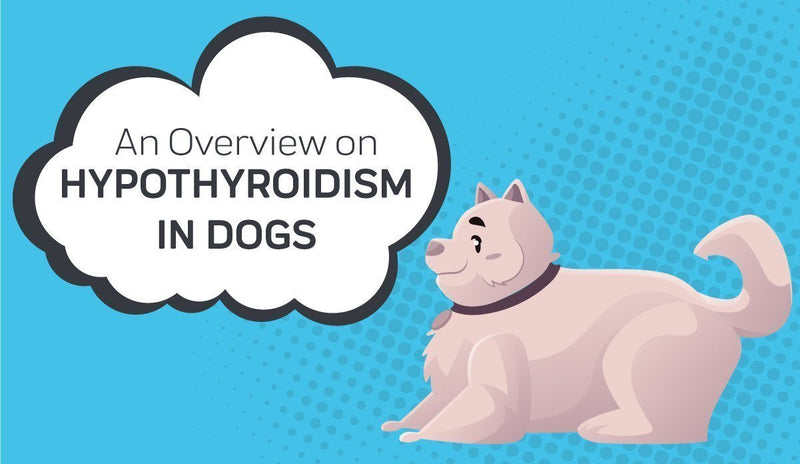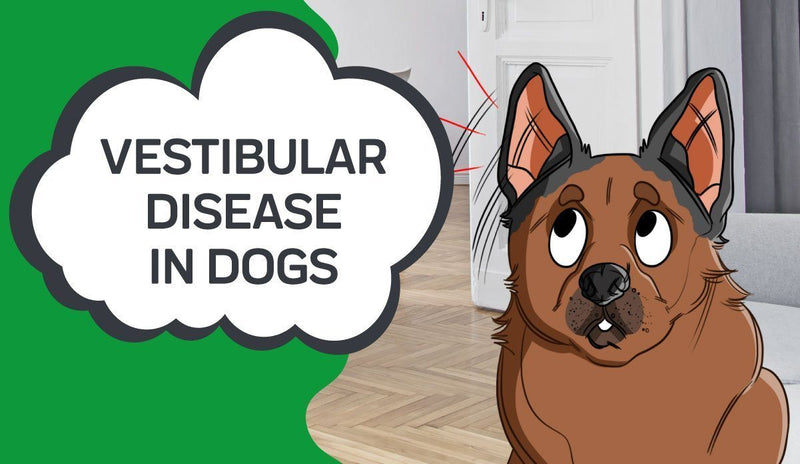- What a Dog's Liver Does
- Where is A Dog's Liver Located
- Liver Problems in Dogs
- What is Liver Damage in Dogs?
- What is Liver Disease and Chronic Liver Disease in Dogs?
- What Causes Canine Liver Disease and Damage?
- What is Liver Failure?
- Stages of Liver Failure in Dogs
- How to Know Your Dog has Liver Damage or Liver Disease?
- How to Treat Liver Damage and Liver Disease
- CBD Oil for Canine Liver Disease and Liver Failure
- Are there downsides to using CBD oil for liver failure in dogs?
- Using CBD Oil
- Purchasing CBD Oil
- Innovations from Innovet

Liver problems are a pretty common issue for dogs, so it is wise as a dog owner to understand what to look for and how to keep your dog's liver function healthy. Sometimes it is even necessary to take proactive measures to protect some dogs' livers. This post will explain everything about liver disease in dogs, including how CBD Oil can help.
What a Dog's Liver Does
While not spoken about much, the liver is the largest organ of a dog's body after their skin and it is incredibly important in helping their body function normally. It performs more than 1,000 crucial bodily functions impacting the blood clotting, nutrient management, toxin elimination, hormones, metabolism, and more.
Poor liver health is also much more common than most dog owners realize. Liver disease in dogs is one of the top five causes of non-accidental death in dogs of any age and one of the top four causes of death in older dogs.
Where is A Dog's Liver Located
It's natural to wonder this when thinking about the liver and potential problems with it. A dog's liver is located in the center of the abdomen between their lungs and stomach. Kind of like the center of the dog's belly, working toward the front half of the dog.
Liver Problems in Dogs
There are many liver disorders that can go wrong with a dog; acute liver failure, infectious canine hepatitis, endocrine diseases, liver cancer and many more. Most occur later in the dog's life, but some can occur at any time and some occur at birth.
In this post, we'll discuss most of the causes as well as the symptoms and treatment options for them.
What is Liver Damage in Dogs?
The liver becomes damaged before it becomes diseased, similar to how gingivitis left untreated becomes periodontal disease.
The problem is that liver damage has vague symptoms and an underlying cause that doesn't seem obviously connected to the liver. Blood tests and testing liver tissue are needed for a definitive diagnosis of the most common liver disorders.
Symptoms of liver damage in dogs include:

- loss of appetite
- constipation
- diarrhea
- unexplained weight loss
- darker urine
- skin conditions
- poor coat quality
- hair loss
- brittle, weakened, or infected nails
- weakness
- fatigue
- lethargy
- irritability and/or aggression
- depression
- generally seeming unwell
As you can see, most pet parents would get concerned about their dog when displaying these symptoms, but we probably wouldn't think about their liver unless we knew to do so.
It is very important to be aware of this potential because catching liver damage before liver failure occurs in dogs makes a tremendous difference in the chances of recovery.
Investigate these symptoms to determine their cause, and be proactive about your dog's liver health before they show these symptoms or as soon as you notice the symptoms.
What is Liver Disease and Chronic Liver Disease in Dogs?
Liver disease in dogs can be an acute disease brought on by poisoning or a chronic disease brought on by a vast array of factors like copper storage or another kidney disease like diabetes. No matter the cause, they all mean the same thing, the dog's liver function is unwell.
The reason for the liver disease does impact how quickly the symptoms appear, so do not rule out liver disease in dogs because symptoms are either sudden or gradual. Both situations can happen with liver disease, depending on its cause.
Chronic Liver Disease in Dogs is not the same as Chronic Liver Failure. It's a chronic, progressive disease that can lead to complete failure of the liver and death if left untreated or improperly managed.
What are some signs of Chronic Liver Disease?
Some symptoms may be yellowing eyes, vomiting bile acids-stained vomit, abdominal pain caused by enlarged livers pressing on other organs such as kidneys or intestines; occasionally bloating due to fluid accumulation secondary to hepatomegaly (enlarged liver).
Symptoms of liver disease in dogs include:
- jaundice, yellowing of skin, gums, and eyes
- vomiting
- blood in pee
- blood in poop
- increased urination
- increased thirst
- drooling
- fluid retention and swelling in the abdomen
- lack of coordination
- confusion
- blindness
- seizures
It is imperative to have liver disease diagnosed as quickly as possible. The disease ravages the body, damaging other bodily functions even up until 80% of the liver is damaged. This means your dog still maintains some appearance of health while the disease is growing ever more difficult to treat, eventually impossibly to do so. Do not wait until your dog appears seriously ill to have them checked for liver disease.
What Causes Canine Liver Disease and Damage?
There are many causes of liver damage and disease. Below we have listed and discussed some of the main factors in liver diseases.
Getting Older
Dogs are more likely to develop liver damage as they age. Like any other organ, it both starts to function less optimally over time and has had time to suffer from damaging things that have happened to it.
Medications
Prescribed medications can cause liver damage because they have to be processed by the liver. Medications contain chemicals that the dog's liver must filter out like it does toxins, if the amount that passes through is larger than the dog's liver can handle, it can cause damage and disease. This should not be a problem unless the dog is taking a very large dose of medication, has been placed on a medication for a very long time, or there is already something wrong with the dog's liver, and your vet should discuss risks versus benefits for either of these situations.
Medications containing the most chemicals that may eventually damage the liver are flea and tick, deworming, vaccinations, and painkilling medications.
Toxins
Lead, iron, salt, copper, mercury, phosphorus, cleaning supplies, poisons, insect bites and stings, mold, toxic foods, and toxic plants can lead to acute or chronic liver damage depending on the quantities ingested and the number of ingestions. Genetically predisposed dogs will be more at risk with these factors so pet owners should always be aware of their breeds genetic make up if possible.
Copper Storage
If the dog's body retains too much copper, it will collect in the liver and cause damage and eventually disease. Some breeds like German Shepherds, Golden Retrievers, Labrador Retrievers, Poodles, and Yorkshire Terriers have an increased likelihood of developing copper storage disease.
Fatty Liver Disease
Toy breeds and small breed dogs are prone to developing fatty liver disease where triglycerides build up in the dog's liver and lead to damage and disease. IT's a good idea to monitor your dog's diet in this situation.
Genetics
There are some genes that do not breed-specific that cause a blood flow issue impacting the liver and leading to damage and disease.
Other Diseases
A dog with diabetes, heartworms, heart disease, pancreatic diseases, or viral and a bacterial infection can develop a damaged and diseased liver. It is important to be on the alert for liver issues, have routine checkups, and be proactive regarding liver health if you have a dog with any of these conditions or diseases.
What is Liver Failure?
If liver disease progresses far enough, it will become irreversibly fatal. At this point, it becomes a matter of quality of life. Liver failure can also come on quickly, such as after a dog ingests a sizeable amount of poison.
Symptoms of liver failure are the same as the ones for liver disease, but they are more pronounced. The dog may end up in a coma at this point.
Stages of Liver Failure in Dogs
Licensed veterinarians grade liver failure in stages, similar to how they do cancer.
The first stage is liver damage and it involves inflammation. The liver is being attacked and is trying to heal itself.
The second stage of liver disease occurs when inflammation has persisted long enough to cause the liver to harden and develop scars. This can be reversible if treatment is begun soon enough.
The third stage of liver disease involves permanent scarring. Treatment at this time consists of trying to preserve the health of the rest of the liver.
The fourth stage is liver failure and this is pretty much end stage liver disease. The liver no longer functions as it should and cannot be healed enough to maintain the health of the dog. Treatments involve maintaining comfort and quality of life for as long as possible.
How to Know Your Dog has Liver Damage or Liver Disease?
Diagnosis of liver disease consists of several potential steps.
The licensed veterinarian will observe the dog, looking for a distended abdomen, gastrointestinal signs, neurologic signs, jaundice, issues with the skin or coat, pale mucous membranes, signs of dehydration, lack of coordination, weight loss and lethargy.
If these symptoms and indications are present, they will move on to a blood test, a complete blood count, then test their bile and urine, and afterwards a biopsy may be needed.
Imaging may be needed to determine if any scarring is present.
How to Treat Liver Damage and Liver Disease
Prevention is the best treatment if you still have the opportunity.
Limit the dog's exposure to chemicals and toxins like toxic foods and plants, cleaning products, pesticides, etc.
Avoid fatty foods and foods containing toxins, like some human foods.
Educate yourself on vaccinations and medications that are prescribed for your dog. Ensure that your vet is not overprescribing either and is taking into account the risks versus the benefits of the medication. Medications can be a life-saver for your dog, but they can also make them sick, so do not automatically assume all medications are good or bad for your dog. To protect your dog by double-checking the information and weighing out the situation yourself.
Take your dog to yearly checkups. This is particularly important for dogs that are more likely to develop liver disease.
Once liver damage or liver disease has been discovered, treatment may consist of:
- fluids, electrolytes, and oxygen for acute liver disease
- liver medications
- SAM-E or milk thistle
- changing diet to one higher in vitamins and minerals
- rest
- treatment of another condition causing the liver damage
CBD Oil for Canine Liver Disease and Liver Failure
CBD oil could help manage liver damage, and studies show it can also improve the symptoms associated with liver disease and liver failure.
CBD is cannabidiol, a hemp-derived cannabinoid that helps a dog's body regulate its own cannabinoids. Yes, scientists have discovered that humans and dogs have an endocannabinoid system, cannabinoid receptors all over the body, that play a huge part in managing health and wellness. External cannabinoids like cannabidiol jump start the body's ability to do what it is already supposed to be doing but may be struggling at.
The many benefits of CBD is dazzling scientists with its ability to impact a broad spectrum of health aspects, some of which may be a huge benefit to your dog with liver disease or an increased risk of developing liver disease.
CBD oil studies show that it is a powerful anti-inflammatory and since inflammation is what damages the liver, you can see how using CBD oil could be beneficial to managing liver damage and its symptoms.
CBD may also:
- alleviate pain
- improve mood
- reduce stress
- boost energy
- improve appetite
- soothe digestive issues
- provide nutrients
- help dogs sleep with higher doses
- prevent and lessen seizures
- improve balance
While undergoing treatments for liver disease, or dealing with a failed liver, CBD can improve the dog's life, easing symptoms that make treatments less effective and making them feel better.
Are there downsides to using CBD oil for liver failure in dogs?
CBD comes from the cannabis family, and it may share many health benefits with marijuana, but it does not contain THC, so you don't have to worry about your dog being "high." Minimal, if any.
CBD is not a healthy hammer, whopping a dog's body with feel good benefits and then leaving them to crash. It manages and regulates functions that help the dog's body maintain its own health.
There are virtually no side effects. If the dog takes a very large dose of CBD, they may experience diarrhea, changes in appetite, or sedation. That's a far safer sounding list of side effects than most prescription medications can offer.
CBD is not tried and true like traditional medications. The science is still new regarding it, and while it does show great promise and even veterinarians consider it a worthy secondary or primary treatment in many cases, you don't want to rule out the possibility that another route may prove necessary. CBD is best used when other treatments are proven ineffective, the side effects of traditional treatment are threatening its success, or a disease has gone too far to be treated with conventional means.
Using CBD Oil
There are several types of CBD oil you can purchase for your dog with liver disease:
- oil tinctures
- extract concentrates
- capsules
- treats
CBD Oil tinctures come with a dropper or sprayer so the oil can be applied directly to the dog's mouth or to their food. It is often flavored to mask the distinctive and often off-putting taste of hemp.
CBD Capsules avoid the whole taste issue and can be easier to get into some dogs. They should contain only CBD oil and what ingredients are necessary to turn it into a capsule. CBD Extract concentrates contain nothing but CBD oil and can be applied to the dog's mouth or their food. These are the most cost-effective option and guaranteed to be free of any weird ingredients, but they may be harder to get into a dog because of the taste.
Hemp Dog Treats are the easiest delivery method for CBD as treats are fun. You can add these to your pet's diet or replace a current treat with them. Check the ingredients list for fat, copper, or any other substance a dog shouldn't have for liver concerns. They shouldn't be in there, but it's wise to look.
Dosing CBD for pets instructions come on the package of the CBD product and will be based on the dog's size. Very small, large, young, old, or sick dogs may have special dosing requirements. It is wise to consult your veterinarian to discuss CBD use so they can help you determine the exact dosages for your individual dog and so they'll know the dog is taking CBD should it impact their treatments.
Purchasing CBD Oil
There are certain things you should look for when purchasing CBD oil.
Full-spectrum versus CBD isolate
Both of these types of CBD are quite good, but you should know which one you are buying because some people find that one works better than the other for their unique situation and you need to know which ones do work for your dog so you can buy it again.
CBD isolate is just CBD, while full-spectrum is CBD with other cannabinoids, terpenes, and nutrients found in the hemp plant. Full-spectrum is actually the most popular option and may be the best one to choose for your dog with liver disease as it also contains additional nutrients. Should full-spectrum let you down, don't give up on CBD altogether. You may find that CBD isolate works for your dog.
Third-party Testing
Tragically, all CBD products are not legitimate. Some manufacturers sell CBD products that do not contain enough CBD or any CBD at all! This is why reputable CBD manufacturers supply their third-party lab test results to prove they are offering what they say they're offering.
Extraction Method
Choose manufacturers who say they used the CO2 extraction method as this is the safest and purest one.
Ingredients
Look for CBD products with only necessary, safe, and natural ingredients. Organic is best. As mentioned in the treat section, take special precautions to check for ingredients that may be harmful to the liver.
Innovations from Innovet
Innovet started out making CBD products to help dogs manage hard-to-treat ailments, and we know that means unique challenges. If your dog has a specific need not met by current CBD products, please contact us so we can try to find a solution for your dog.
Sources:
Cannabidiol improves brain and liver function
A Cross-Sectional Study of Cannabidiol Users
Transdermal cannabidiol reduces inflammation
Disorders of the Liver and Gallbladder in Dogs
Approved by:
Dr. Sara Ochoa
Doctor of Veterinary Medicine, St. Georges University

Thanks for stopping by!
P.S. We Love You!
Sincerely,
The Innovet Team
Please do not ask for emergency or specific medical questions about your pets in the comments. Innovet Pet Products is unable to provide you with specific medical advice or counseling. A detailed physical exam, patient history, and an established veterinarian are required to provide specific medical advice. If you are worried that your pet requires emergency attention or if you have specific medical questions related to your pet’s current or chronic health conditions, please contact or visit your local/preferred veterinarian, an animal-specific poison control hotline, or your local emergency veterinary care center.
Please share your experiences and stories, your opinions and feedback about this blog, or what you've learned that you'd like to share with others.



















Due to liability issues, we can not provide advice when it comes to medications or prescriptions. Our customers use our product for many different things along with other medications. So many that, it is hard for us to keep track of. We created a Facebook group for our customers to discuss what they use our product for, what works and what doesn’t, etc. It is called Innovet Pet Talk & Support: CBD for Dogs, Cats, & More. Perhaps you can find more information there 🙂
For additional help in managing your pet’s specific medical condition – whether with CBD or not – we advise you to consult only with a licensed veterinarian for medical advice.
My Yorkie name is Bailey and he has a liver problem and he takes medication for it, and it’s really costing me a lot of money to keep him healthy and Happy, his weight is 8.96 pounds and he takes the medication called DENAMARIN, it costs me $32.00 Dollars each month and I am afraid that I can’t keep on helping with his medication, it’s so expensive. Please tell me what I should do. PLEASE.